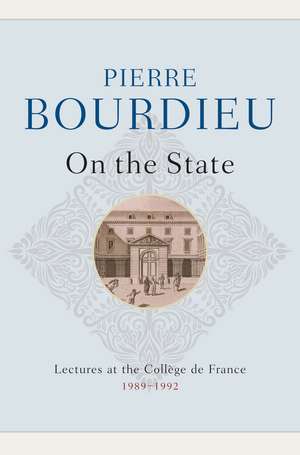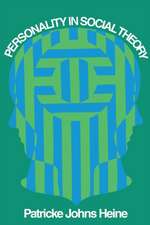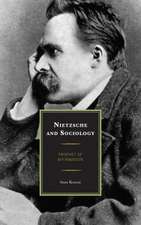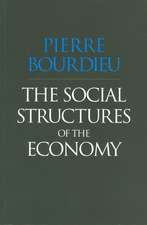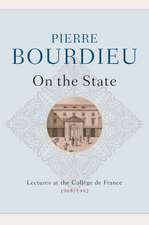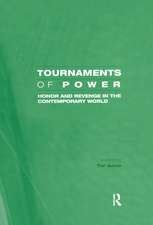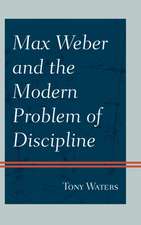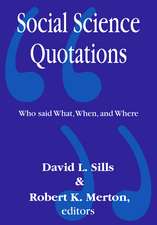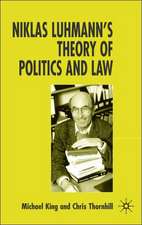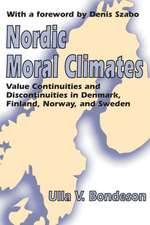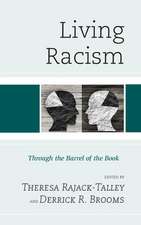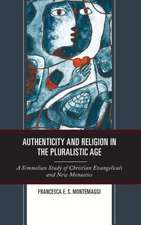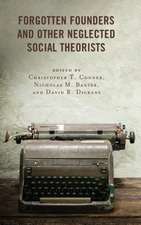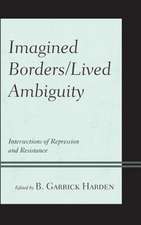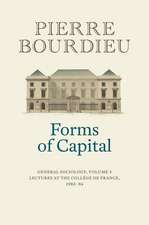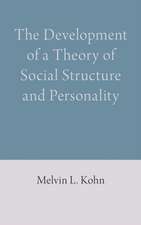On the State: Lectures at the College de France, 1989 - 1992
Autor P Bourdieuen Limba Engleză Hardback – 22 dec 2014
In this major work the great sociologist Pierre Bourdieu addresses these fundamental questions. Modifying Max Weber s famous definition, Bourdieu defines the state in terms of the monopoly of legitimate physical and symbolic violence, where the monopoly of symbolic violence is the condition for the possession and exercise of physical violence. The state can be reduced neither to an apparatus of power in the service of dominant groups nor to a neutral site where conflicting interests are played out: rather, it constitutes the form of collective belief that structures the whole of social life. The collective fiction of the state Ð a fiction with very real effects – is at the same time the product of all struggles between different interests, what is at stake in these struggles, and their very foundation.
While the question of the state runs through the whole of Bourdieu s work, it was never the subject of a book designed to offer a unified theory. The lecture course presented here, to which Bourdieu devoted three years of his teaching at the Collège de France, fills this gap and provides the key that brings together the whole of his research in this field. This text also shows another Bourdieu , both more concrete and more pedagogic in that he presents his thinking in the process of its development. While revealing the illusions of state thought designed to maintain belief in government being oriented in principle to the common good, he shows himself equally critical of an anti–institutional mood that is all too ready to reduce the construction of the bureaucratic apparatus to the function of maintaining social order.
At a time when financial crisis is facilitating the hasty dismantling of public services, with little regard for any notion of popular sovereignty, this book offers the critical instruments needed for a more lucid understanding of the wellsprings of domination.
Preț: 514.65 lei
Preț vechi: 635.37 lei
-19% Nou
98.48€ • 102.82$ • 81.50£
Carte tipărită la comandă
Livrare economică 04-18 aprilie
Specificații
ISBN-10: 074566329X
Pagini: 480
Dimensiuni: 161 x 244 x 40 mm
Greutate: 0.82 kg
Ediția:New.
Editura: Polity Press
Locul publicării:Chichester, United Kingdom
Public țintă
Students of the social sciences, as well as anyone who wishes to gain a greater understanding of Bourdieu s excellent contribution to the field of social theory.Cuprins
Editors note
Year 1989–1990
Lecture of 18 January 1990
An inconceivable object. – The state as neutral site. – The Marxist tradition. – The calendar and the structure of temporality. – State categories. – Acts of state. – The private housing market and the state. – The Barre commission on housing.
Lecture of 25 January 1990
The theoretical and the empirical. – State commissions and productions. – The social construction of public problems. – The state as viewpoint of viewpoints. – Official marriage. – Theory and theory effects. – The two meanings of the word state . – Transforming the particular into the universal. – The obsequium. – Institutions as organized trustee . – Genesis of the state. Difficulties of the undertaking. – Parenthesis on the teaching of research in sociology.
Lecture of 1 February 1990
The rhetoric of the official. – The public and the official. – The universal other and censorship. – The legislator as artist . – The genesis of public discourse. – Public discourse and imposition of form. – Public opinion.
Lecture of 8 February 1990
The concentration of symbolic resources. – Sociological reading of Franz Kafka. – An untenable research programme. – History and sociology. – Shmuel Noah Eisenstadt s The Political Systems of Empires. – Perry Anderson s two books. – The problem of Barrington Moore s three roads .
Lecture of 15 February 1990
The official and the private. – Sociology and history: genetic structuralism. – Genetic history of the state. – Game and field. – Anachronism and illusion of the nominal. – The two faces of the state.
Year 1990–1991
Lecture of 10 January 1991
Historical approach and genetic approach. – Research strategy. – Housing policy. – Interactions and structural relations. – Self–evidence as an effect of institutionalization. – The effect of that s the way it isÉ and the closing of possibilities. – The space of possibilities. – The example of spelling.
Lecture of 17 January 1991
Reminder of the course s procedure. – The two meanings of the word state : state as administration, state as territory. – The disciplinary division of historical work as an epistemological obstacle. – Models of state genesis, 1: Norbert Elias. – Models of state genesis, 2: Charles Tilly.
Lecture of 24 January 1991
Reply to a question: the notion of invention under structural constraint. – Models of state genesis, 3: Philip Corrigan and Derek Sayer. – The exemplary particularity of England: economic modernization and cultural archaisms.
Lecture of 31 January 1991
Reply to questions. – Cultural archaisms and economic transformations. – Culture and national unity: the case of Japan. – Bureaucracy and cultural integration. – National unification and cultural domination.
Lecture of 7 February 1991
Theoretical foundations for an analysis of state power. – Symbolic power: relations of force and relations of meaning. – The state as producer of principles of classification. – Belief effect and cognitive structures. – The coherence effect of state symbolic systems. – The school timetable as a state construction. – The producers of doxa.
Lecture of 14 February 1991
Sociology, an esoteric science with an exoteric air. – Professionals and lay people. – The state structures the social order. – Doxa, orthodoxy, heterodoxy. – Transmutation of private into public: the appearance of the modern state in Europe.
Lecture of 21 February 1991
Logic of the genesis and emergence of the state: symbolic capital. – The stages of the process of concentration of capital. – The dynastic state. – The state as a power over powers. – Concentration and dispossession of kinds of capital: the example of physical force capital. – Constitution of a central economic capital and construction of an autonomous economic space.
Lecture of 7 March 1991
Reply to questions: conformity and consensus. – Concentration processes of the kinds of capital: resistances. – The unification of the legal market. – The constitution of an interest in the universal. – The state viewpoint and totalization: informational capital. – Concentration of cultural capital and national construction. – Natural nobility and state nobility.
Lecture of 14 March 1991
Digression: a forcible intervention in the intellectual field. – The double face of the state: domination and integration. – Jus loci and jus sanguinis. – The unification of the market in symbolic goods. – Analogy between the religious field and the cultural field.
Year 1991–1992
Lecture of 3 October 1991
A model of the transformations of the dynastic state. – The notion of reproduction strategies. – The notion of a system of reproduction strategies. – The dynastic state in the light of reproduction strategies. – The king s house . – Legal logic and practical logic of the dynastic state. – Objectives of the next lecture.
Lecture of 10 October 1991
The house model versus historical finalism. – The issues in historical research on the state. – The contradictions of the dynastic state. – A tripartite structure.
Lecture of 24 October 1991
Recapitulation of the logic of the course. – Family reproduction and state reproduction. – Digression on the history of political thought. – The historical work of lawyers in the process of state construction. – Differentiation of power and structural corruption: an economic model.
Lecture of 7 November 1991
Preamble: the difficulties of communication in social science. – The example of institutionalized corruption in China: 1) the ambiguous power of sub–bureaucrats. –The example of institutionalized corruption in China: 2) the pure . – The example of institutionalized corruption in China: 3) double game and double I . – The genesis of the bureaucratic space and the invention of the public.
Lecture of 14 November 1991
Construction of the republic and construction of the nation. – The constitution of the public in the light of an English treatise on constitutional law. – The use of royal seals: the chain of guarantees.
Lecture of 21 November 1991
Reply to a question on the public/private contrast. – The transmutation of private into public: a non–linear process. – The genesis of the meta–field of power: differentiation and dissociation of dynastic and bureaucratic authorities. – A research programme on the French Revolution. – Dynastic principle versus legal principle: the lit de justice as case study. – Methodological digression: the kitchen of political theories. – Legal struggles as symbolic struggles for power. – The three contradictions of lawyers.
Lecture of 28 November 1991
History as an issue of struggle. – The legal field: a historical approach. – Functions and functionaries. – The state as fictio juris. – Legal capital as linguistic capital and practical control. – Lawyers in confrontation with the church: a corporation acquires autonomy. – Reformation, Jansenism and legalism. – The public: an unprecedented reality in constant development.
Lecture of 5 December 1991
Programme for a social history of political ideas and the state. – The interest in disinterestedness. – Lawyers and the universal. – The (false) problem of the French Revolution. – The state and the nation. – The state as civil religion . – Nationality and citizenship: contrast between the French and German models. – Struggles of interest and struggles of unconscious in political debate.
Lecture of 12 December 1991
Construction of the political space: the parliamentary game. – Digression: television in the new political game. – From the paper state to the real state. – Domesticating the dominated: the dialectic of discipline and philanthropy. – The theoretical dimension of state construction. – Questions for a conclusion.
Appendixes
Course summaries as published in the Annuaire of the Collège de France
1989–1990, 1990–1991, 1991–1992
Position of the lectures on the state in Pierre Bourdieu s work
Bibliography
1. Books and articles on the state, the field of power or the history of political thought
2. Books and articles not directly bearing on the state
Name index
Subject index
Recenzii
European Journal of Sociology
′′The state is this institution that has the extraordinary power of producing a socially ordered world without necessarily giving orders, without exerting a constant coercion there isn?t a policeman behind every car, as people often say. This kind of quasi– magical effect deserves explanation. All other effects; military coercion, economic coercion by way of taxation are in my view secondary in relation to this. I believe that the initial accumulation, contrary to what is maintained by a certain materialist tradition (materialist in the impoverished sense of the term), is an accumulation of symbolic capital: the whole of my work is intended to produce a materialist theory of the symbolic, which is traditionally opposed to the material.′′
Pierre Bourdieu
"This enormous collection of lecture notes could make you feel lost in different countries and different historical periods, but it is successful in sounding very coherent with a very fluent narrative, and it is not distracting for the reader. These lectures certainly present an illuminating and broad content that any social scientist – not necessarily political scientists – should benefit from when reading this book."
Political Studies Review
"Bourdieu s insights break fresh ground in the critical understanding of the state and its perpetration of power.This book impels us to consider the state in its all nuances, while unworking the constructivism immanent in its normativization, and should be of interest to social and political scientists."
Avishek Ray, Rouya Turkiyyah
Notă biografică
Pierre Bourdieu (1930–2002) was one of the most influential sociologists and anthropologists of the late twentieth century. He was Professor of Sociology at the Collège de France and Director of Studies at the École des Hautes Etudes en Science Sociales. His many works include Outline of a Theory of Practice, Distinction: A Social Critique of the Judgement of Taste, The Rules of Art, The Logic of Practice and Pascalian Meditations.
Descriere
What is the nature of the modern state? How did it come into being and what are the characteristics of this distinctive field of power that has come to play such a central role in the shaping of all spheres of social, political and economic life?
In this major work the great sociologist Pierre Bourdieu addresses these fundamental questions. Modifying Max Weber s famous definition, Bourdieu defines the state in terms of the monopoly of legitimate physical and symbolic violence, where the monopoly of symbolic violence is the condition for the possession and exercise of physical violence. The state can be reduced neither to an apparatus of power in the service of dominant groups nor to a neutral site where conflicting interests are played out: rather, it constitutes the form of collective belief that structures the whole of social life. The collective fiction of the state Ð a fiction with very real effects – is at the same time the product of all struggles between different interests, what is at stake in these struggles, and their very foundation.
While the question of the state runs through the whole of Bourdieu s work, it was never the subject of a book designed to offer a unified theory. The lecture course presented here, to which Bourdieu devoted three years of his teaching at the Collège de France, fills this gap and provides the key that brings together the whole of his research in this field. This text also shows another Bourdieu , both more concrete and more pedagogic in that he presents his thinking in the process of its development. While revealing the illusions of state thought designed to maintain belief in government being oriented in principle to the common good, he shows himself equally critical of an anti–institutional mood that is all too ready to reduce the construction of the bureaucratic apparatus to the function of maintaining social order.
At a time when financial crisis is facilitating the hasty dismantling of public services, with little regard for any notion of popular sovereignty, this book offers the critical instruments needed for a more lucid understanding of the wellsprings of domination.
